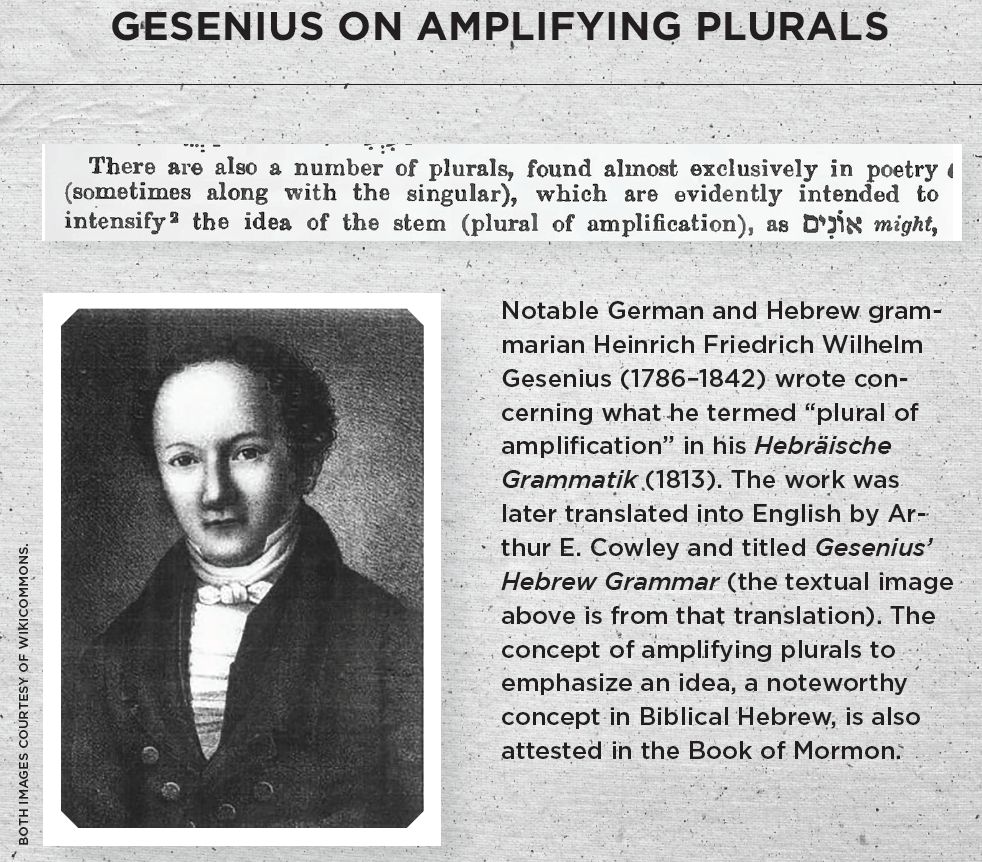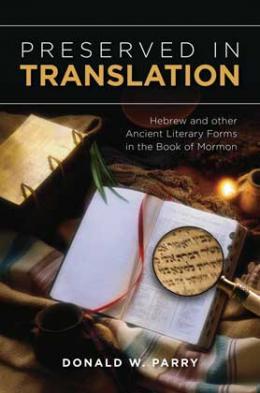Idea-Amplifying Plurals
Donald W. Perry, “Idea-Amplifying Plurals,” in Preserved in Translation: Hebrew and Other Ancient Literary Forms in the Book of Mormon (Provo, UT: Religious Studies Center, Brigham Young University; Salt Lake City: Deseret Book), 99‒102.
"great condescensions" (Jacob 4:7)
Biblical Hebrew often uses plural nouns to amplify or emphasize an idea, even when we would expect the singular form to be more appropriate. Biblical Hebrew grammarian Wilhelm Gesenius calls this concept the “plural of amplification”[1] and provides several examples from the Old Testament, including the following:
God “calleth them all by names by the greatness of his might” (KJV Isaiah 40:26); the Hebrew literally reads “by the greatness of his mights,” amplifying God’s unparalleled might.
“For it is a people of no understanding” (KJV Isaiah 27:11); the Hebrew literally reads “no understandings,” emphasizing the magnitude of the people’s lack of understanding.
“For they are a nation void of counsel” (KJV Deuteronomy 32:28); the Hebrew reads the plural “counsels,” indicating that the nation lacks counsel to a serious degree.
“The wondrous works of him which is perfect in knowledge” (KJV Job 37:16); the Hebrew reads “perfect in knowledges,” thus underscoring that God’s knowledge is matchless.
“For there is no faithfulness in their mouth; their inward part is very wickedness” (KJV Psalm 5:9); the Hebrew reads “their inward part is wickednesses,” stressing the enormity of the wickedness.
“He that walketh righteously” (KJV Isaiah 33:15); the Hebrew reads literally “He walketh righteousnesses,” meaning the person is extremely righteous.
In all of these examples, the King James translators translated the Hebrew plural nouns into English as singular in number, perhaps because they did not recognize this literary form as good Hebrew or because they preferred a smooth and idiomatic English translation.

In the following additional examples from the Old Testament, the plural of amplification (as translated directly from the Hebrew) appears in brackets:
“thy brother’s blood [bloods] crieth unto me from the ground” (Genesis 4:10)
“strength of salvation [salvations]” (Isaiah 33:6)
“O Lord God, to whom vengeance [vengeances] belongeth” (Psalm 94:1)
“Wisdom [wisdoms] crieth without; she uttereth her voice in the streets” (Proverbs 1:20)
“the wicked . . . shall be brought forth to the day of wrath [wraths]” (Job 21:30)
The Book of Mormon contains several peculiar plural nouns:[2]
“great slaughters with the sword” (1 Nephi 12:2)
“mine afflictions were great above all” (1 Nephi 15:5)
“all the energies of my soul” (1 Nephi 15:25)
“by bloodsheds, and by pestilence” (2 Nephi 6:15; see 1:12)“great condescensions unto the children of men” (Jacob 4:7)
“labor with their mights” (Jacob 5:72)
“the understandings of the children of men” (Mosiah 8:20)
“there were . . . magics” (Mormon 1:19)
“foolish imaginations of his heart” (1 Nephi 2:11)
“destructions of my people” (1 Nephi 15:5)
The “amplified” plurals in this list remain tentative; additional research needs to be conducted before we identify them as instances of Hebraic plural of amplification with a high degree of certainty. However, it is clear in each case that English readers would fully expect to see the singular rather than the plural. Interestingly, each of these plurals serves to emphasize or amplify the item that is being pluralized, after the Hebrew manner. “Destructions of my people,” for instance, amplifies the fact that the destruction that Nephi saw in vision—in this case the downfall of the Nephite nation—was truly devastating.[3]
The possibility that these unexpected plural nouns in the Book of Mormon are, like so many other language oddities in the book, best explained by Hebrew linguistic inheritance is indeed intriguing but must await further study.
Notes
[1] Gesenius, Hebrew Grammar, 397–98.
[2] For a brief treatment of plural of amplification in the Book of Mormon, see Crowell, “Hebraisms in the Book of Mormon,” 7; and Parry, “Hebraisms and Other Ancient Peculiarities,” 173.
[3] Note that the printer’s manuscript and the 1830 edition of the Book of Mormon have the plural destructions, whereas the current edition has the singular noun form. See Skousen, Printer’s Manuscript, 1:101.
